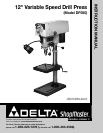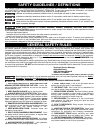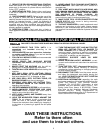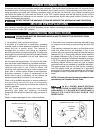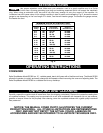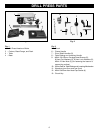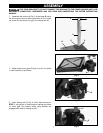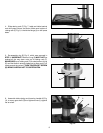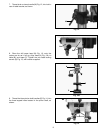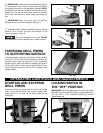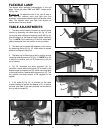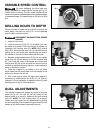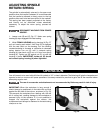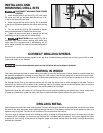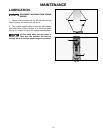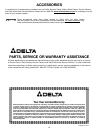
3
17. REDUCE THE RISK OF UNINTENTIONAL STARTING.
Make sure switch is in “OFF” position before plugging in
power cord.
In the event of a power failure, move switch
to the “OFF” position.
18. NEVER STAND ON TOOL. Serious injury could occur
if the tool is tipped or if the cutting tool is accidentally
contacted.
19. CHECK DAMAGED PARTS. Before further use of the
tool, a guard or other part that is damaged should be
carefully checked to ensure that it will operate properly and
perform its intended function – check for alignment of
moving parts, binding of moving parts, breakage of parts,
mounting, and any other conditions that may affect its
operation. A guard or other part that is damaged should be
properly repaired or replaced.
20. DIRECTION OF FEED. Feed work into a blade or
cutter against the direction of rotation of the blade or cutter
only.
21. NEVER LEAVE TOOL RUNNING UNATTENDED.
TURN POWER OFF. Don’t leave tool until it comes to a
complete stop.
22.
STAY ALERT, WATCH WHAT YOU ARE DOING, AND
USE COMMON SENSE WHEN OPERATING A POWER
TOOL. DO NOT USE TOOL WHILE TIRED OR UNDER
THE INFLUENCE OF DRUGS, ALCOHOL, OR
MEDICATION. A moment of inattention while operating
power tools may result in serious personal injury.
23. MAKE SURE TOOL IS DISCONNECTED FROM
POWER SUPPLY while motor is being mounted,
connected or reconnected.
24. THE DUST GENERATED by certain woods and wood
products can be injurious to your health. Always operate
machinery in well ventilated areas and provide for proper
dust removal. Use wood dust collection systems whenever
possible.
ADDITIONAL SAFETY RULES FOR DRILL PRESSES
FAILURE TO FOLLOW THESE RULES MAY RESULT IN SERIOUS PERSONAL INJURY.
SAVE THESE INSTRUCTIONS.
Refer to them often
and use them to instruct others.
1. DO NOT OPERATE THIS TOOL UNTIL it is
assembled and installed according to the
instructions.
2. OBTAIN ADVICE from your supervisor, instructor,
or another qualified person if you are not familiar
with the operation of this tool.
3. FOLLOW ALL WIRING CODES and recommended
electrical connections.
4. NEVER START THE MACHINE BEFORE
CLEARING THE TABLE of all objects (tools, scrap
pieces, etc.).
5. NEVER START THE MACHINE with the drill bit,
cutting tool, or sander against the workpiece.
6. TIGHTEN ALL LOCK HANDLES before starting the
machine.
7. USE ONLY DRILL BITS, CUTTING TOOLS,
SANDING DRUMS, OR OTHER ACCESSORIES
that have shanks of 1/2" in diameter or less.
8. USE ONLY DRILL BITS, CUTTING TOOLS, OR
SANDING DRUMS that are not damaged.
9. PROPERLY LOCK DRILL BIT, CUTTING TOOL,
OR SANDING DRUM IN THE CHUCK before
operating this machine.
10. USE RECOMMENDED SPEEDS for all operations.
11. AVOID AWKWARD OPERATIONS AND HAND
POSITIONS where a sudden slip could cause a
hand to move into the cutting tool.
12. KEEP ARMS, HANDS, AND FINGERS away from
the cutting tool.
13. HOLD THE WORKPIECE FIRMLY AGAINST THE
TABLE. Do not attempt to drill a workpiece that
does not have a flat surface against the table.
Prevent the workpiece from rotating by clamping it
to the table or by securing it against the drill press
column.
14. TURN THE MACHINE “OFF” AND WAIT FOR THE
DRILL BIT, CUTTING TOOL, OR SANDER TO
STOP TURNING prior to cleaning the work area,
removing debris, removing or securing workpiece,
or changing the angle of the table. A moving drill bit,
cutting tool, or sander can be dangerous.
15 PROPERLY SUPPORT LONG OR WIDE
workpieces.
16. NEVER PERFORM LAYOUT, ASSEMBLY, or set-
up work on the table/work area when the machine is
running.
17 TURN THE TOOL “OFF”, disconnect the tool from
the power source before installing or removing
accessories, before adjusting or changing set-ups,
or when making repairs.
18. DISCONNECT THE TOOL from the power source,
and clean the table/work area before leaving the
tool. LOCK THE SWITCH IN THE “OFF” POSITION
to prevent unauthorized use.
19. ADDITIONAL INFORMATION regarding the safe
and proper operation of this tool is available from the
Power Tool Institute, 1300 Summer Avenue,
Cleveland, OH 44115-2851. Information is also
available from the National Safety Council, 1121
Spring Lake Drive, Itasca, IL 60143-3201. Please
also refer to the American National Standards
Institute ANSI 01.1 Safety Requirements for
Woodworking Machines and the U.S. Department of
Labor OSHA 1910.213 Regulations.



